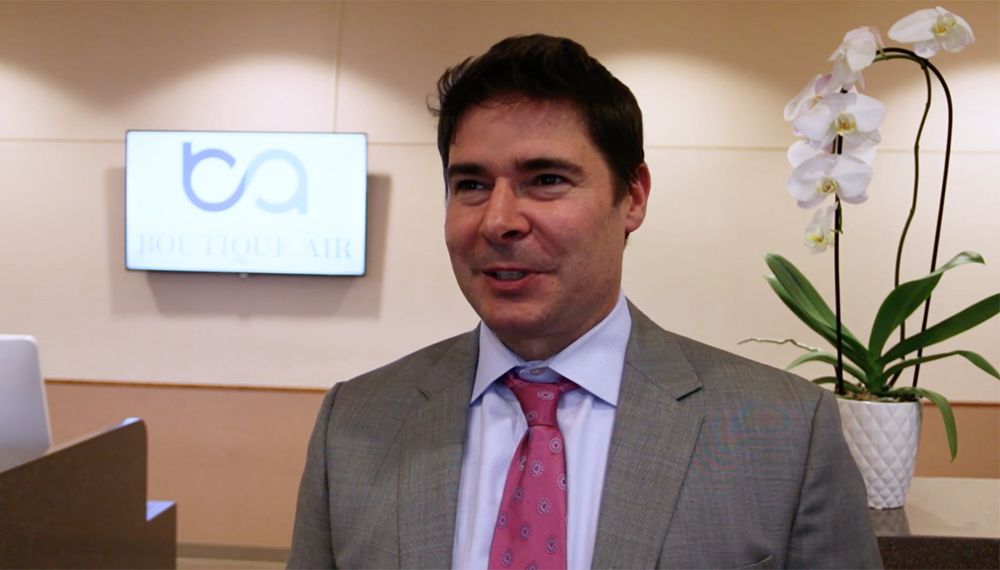Original article by Paul Tooher from http://aviationtribune.com/

Original article by Paul Tooher from http://aviationtribune.com/
Shawn Simpson never expected to be running an airline.
“I did not expect to become an airline CEO in the least,” he said with a chuckle.
Today, however, he’s the Chief Executive Officer and majority shareholder of Boutique Air, with 25 aircraft serving 30 communities in 14 states and 450 employees.
An unplanned “sequence of events” led Simpson, who graduated from the University of California at Santa Cruz with a double major in biology and environmental studies, to a career in commercial aviation, he said.
After college, Simpson took a job as a cartographer for GreenInfo Network in San Francisco. He soon discovered that the job required greater computer skills than he possessed, so he learned to write computer code.
After a little more than a year, Simpson took his newly acquired skills to Xoom, a leading digital money transfer provider before moving on to Google, where he served as a systems administrator.
While he has nothing but high praise for his former employer, Simpson admits the high-pressure atmosphere at the search engine giant led him to decide after five years that he needed to take a break.
Simpson moved to New York, where he worked as a consultant for a firm involved in the aviation industry and learned a lot about the business.
After moving back to San Francisco in 2009, Simpson decided with this “new-found aviation knowledge it might be fun and cool to start a company,” he said.
Initially, he sought to create a business that was “in the aviation-travel space, but more on the technology side of things,” he recalled.
After setting up an airline reservation company, Simpson decided in 2011 to become even more involved in the aviation industry by buying “a charter company that had a FAA license and one small plane with it.”
But a one-plane charter airline hardly needed a high-tech reservation system. So, “after a little while, we decided to go for it.”
In 2014, Boutique Air successfully bid for the air route connecting Clovis, N.M., with Dallas-Fort Worth under the federally financed Essential Air Service (EAS) program.
EAS was part of the Airline Deregulation Act that was enacted in 1978. The program was put into place to guarantee that those small communities that were served by certificated air carriers before airline deregulation maintained a minimal level of scheduled air service.

Boutique Air operates 21 PC-12s and four King Air 350s | TVJ2011 (CC BY-SA 4.0)
The Department of Transportation currently subsidizes commuter and certificated air carriers to serve approximately 60 communities in Alaska and 115 communities in the lower 48 contiguous states. Its budget for fiscal 2016 was $288 million, according to the department.
“We were just a little company with one plane and no real background in airlines, but [officials in Clovis] put their faith in us,” Simpson said.
One successful bid led to another.
“So, three years ago, we have one route and one plane, and now we’re operating in 30 cities and have 25 airplanes,” Simpson said.
About 10 percent of its current business involves charters while the remainder is comprised of EAS-subsidized flights.
Simpson called the EAS program “a good place for a small company to get started.”
But there’s always the risk that what the government giveth, the government taketh away. Earlier this year, the Trump administration proposed eliminating all financing for the program in next year’s budget.
That appears unlikely to happen, however. A House budget committee has already including financing for EAS in its federal budget proposal for 2018, and Simpson notes that the program has “a lot of support from both sides of the aisle.”
Simpson hopes to gradually reduce his company’s dependence on EAS by launching non-subsidized routes. “I’d welcome the chance not to be so dependent on a single revenue stream,” he said.
In August, his airline will begin service between Los Angeles and Inyokern, Calif., a small community located near a naval air weapons training center.
Simpson anticipates that many of the workers with high-tech firms that work on projects at the base will be frequent customers of the service.
Boutique Air currently operates 115 flights per day. In 2016, it carried 116,556 passengers. So far this year, it’s carried 93,749 and Simpson believes the passenger total will top 200,000 by the end of the year.
Its most popular route connects Denver with Cortes, Colo.
Boutique Air recently signed an interline agreement with United Airlines. “This is big for us,” he said, because it will allow passengers to easily purchase flights on the United site to communities that Boutique serves.
Currently, the airline operates 25 planes, including 21 PC-12s that seat eight passengers, and four Beechcraft King Air 350s that accommodate nine.
So far, the airline has had no shortage of pilots, a problem that has bedeviled many regional airlines.
“We’re in pretty good shape because we have single-engine planes that weigh less 12,500 pounds,” he said, allowing the airline to hire pilots with fewer hours than those required by regional carriers.
Simpson is not a pilot himself, although he’s acquired 20 hours of flight time and hopes eventually to obtain a license.
“I think I can land a plane and people would be able to walk away,” he quipped.
All Boutique Air flights have two pilots onboard, although only one is required. “Two pilots give you peace of mind, and it is truly safer,” Simpson said. “And when things get complicated in the air, it’s really good to have another pilot there to help out.”
Simpson said the airline’s name was meant to evoke “something a little bit different, a little bit more personal, a little bit nicer but not extravagant, like a boutique hotel.”

